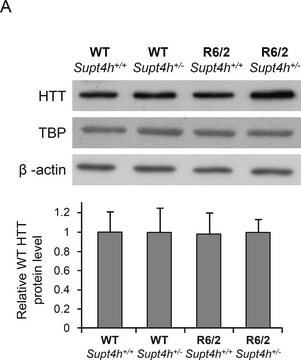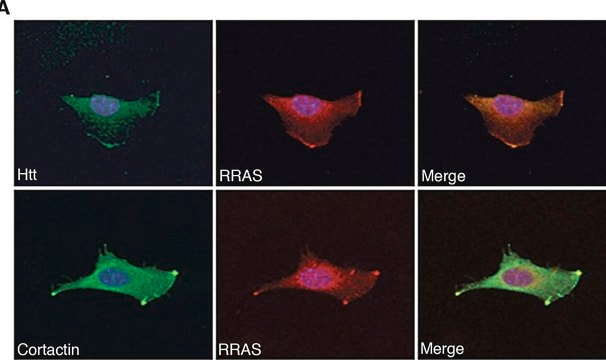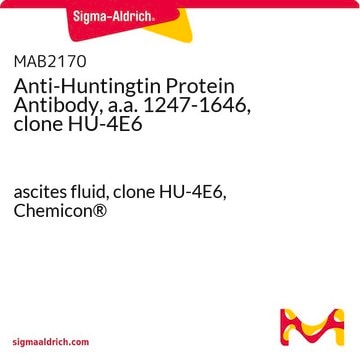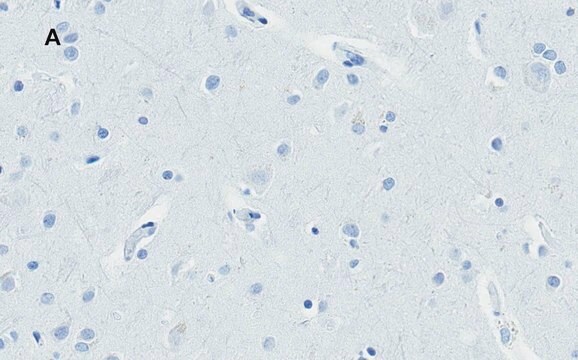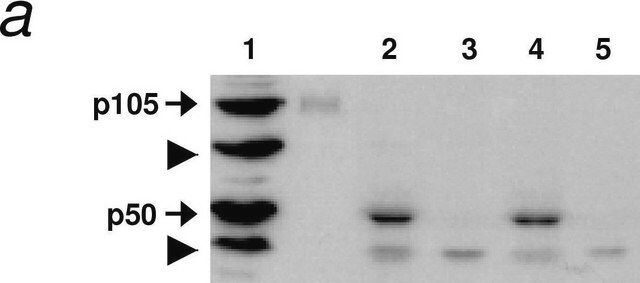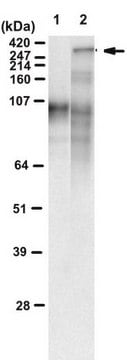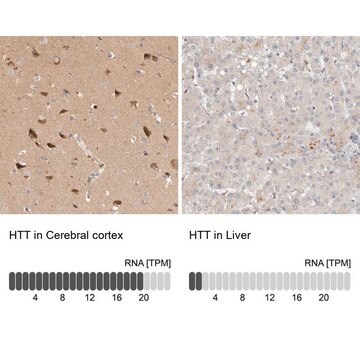おすすめの製品
由来生物
mouse
品質水準
抗体製品の状態
ascites fluid
抗体製品タイプ
primary antibodies
クローン
2B4, monoclonal
化学種の反応性
human
メーカー/製品名
Chemicon®
テクニック
ELISA: suitable
immunocytochemistry: suitable
immunohistochemistry: suitable
western blot: suitable
アイソタイプ
IgG1
NCBIアクセッション番号
UniProtアクセッション番号
輸送温度
dry ice
ターゲットの翻訳後修飾
unmodified
遺伝子情報
human ... HTT(3064) , SLC6A4(6532)
特異性
ハンチンチンタンパク質、アミノ酸1~82に反応します。この抗体は、野生型および変異型ハンチンチンを認識します。
免疫原
エピトープ:a.a.1-82
リコンビナントヒトハンチンチン、アミノ酸1~82。
アプリケーション
ウェスタンブロッティング:1:500~1:5,000
免疫細胞染色(1):1:500~1:5,000
免疫組織染色(1,2):1:500~1:5,000
ELISA:1:500~1:5,000
最適な希釈濃度は、ご自身で決定してください。
免疫細胞染色(1):1:500~1:5,000
免疫組織染色(1,2):1:500~1:5,000
ELISA:1:500~1:5,000
最適な希釈濃度は、ご自身で決定してください。
抗ハンチンチン抗体、a.a.1-82は、ELISA、IC、IHおよびWBに適したハンチンチンに対する抗体です。
研究カテゴリー
ニューロサイエンス
ニューロサイエンス
研究サブカテゴリー
神経変性疾患
神経変性疾患
ターゲットの説明
348 kDa
物理的形状
未精製
防腐剤を含まない腹水。
保管および安定性
-20°Cで出荷日から1年間保存できます。凍結融解を繰り返さないために、分注してください。製品の回復を最大化させるため、キャップを外す前の元のバイアルを融解後に遠心分離してください。
アナリシスノート
コントロール
正常ヒト大脳皮質ライセート、HDまたは野生型マウス由来のマウス大脳皮質サンプル
正常ヒト大脳皮質ライセート、HDまたは野生型マウス由来のマウス大脳皮質サンプル
その他情報
濃度:ロットに固有の濃度につきましては試験成績書をご参照ください。
法的情報
CHEMICON is a registered trademark of Merck KGaA, Darmstadt, Germany
免責事項
メルクのカタログまたは製品に添付されたメルクのその他の文書に記載されていない場合、メルクの製品は研究用途のみを目的としているため、他のいかなる目的にも使用することはできません。このような目的としては、未承認の商業用途、in vitroの診断用途、ex vivoあるいはin vivoの治療用途、またはヒトあるいは動物へのあらゆる種類の消費あるいは適用などがありますが、これらに限定されません。
適切な製品が見つかりませんか。
製品選択ツール.をお試しください
保管分類コード
12 - Non Combustible Liquids
WGK
WGK 1
引火点(°F)
Not applicable
引火点(℃)
Not applicable
適用法令
試験研究用途を考慮した関連法令を主に挙げております。化学物質以外については、一部の情報のみ提供しています。 製品を安全かつ合法的に使用することは、使用者の義務です。最新情報により修正される場合があります。WEBの反映には時間を要することがあるため、適宜SDSをご参照ください。
Jan Code
MAB5492:
試験成績書(COA)
製品のロット番号・バッチ番号を入力して、試験成績書(COA) を検索できます。ロット番号・バッチ番号は、製品ラベルに「Lot」または「Batch」に続いて記載されています。
Gennady Ermak et al.
The Journal of biological chemistry, 284(18), 11845-11853 (2009-03-10)
Our work suggests an important new link between the RCAN1 gene and Huntington disease. Huntington disease is caused by expansion of glutamine repeats in the huntingtin protein. How the huntingtin protein with expanded polyglutamines (mutant huntingtin) causes the disease is
Sophie Vieweg et al.
The Journal of biological chemistry, 291(23), 12074-12086 (2016-03-24)
The first exon of the Huntingtin protein (Httex1) is one of the most actively studied Htt fragments because its overexpression in R6/2 transgenic mice has been shown to recapitulate several key features of Huntington disease. However, the majority of biophysical
Phosphorylation of mutant huntingtin at serine 116 modulates neuronal toxicity.
Watkin, EE; Arbez, N; Waldron-Roby, E; O'Meally, R; Ratovitski, T; Cole, RN; Ross, CA
Testing null
Sean M DeGuire et al.
The Journal of biological chemistry, 293(48), 18540-18558 (2018-09-07)
Huntington's disease is a fatal neurodegenerative disorder resulting from a CAG repeat expansion in the first exon of the gene encoding the Huntingtin protein (Htt). Phosphorylation of this protein region (Httex1) has been shown to play important roles in regulating
S-nitrosylation of dynamin-related protein 1 mediates mutant huntingtin-induced mitochondrial fragmentation and neuronal injury in Huntington's disease.
Haun, F; Nakamura, T; Shiu, AD; Cho, DH; Tsunemi, T; Holland, EA; La Spada, AR; Lipton, SA
Antioxidants & Redox Signaling null
ライフサイエンス、有機合成、材料科学、クロマトグラフィー、分析など、あらゆる分野の研究に経験のあるメンバーがおります。.
製品に関するお問い合わせはこちら(テクニカルサービス)